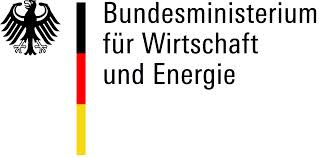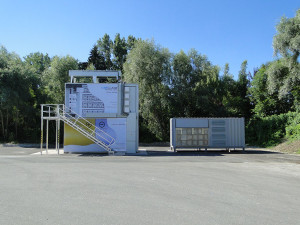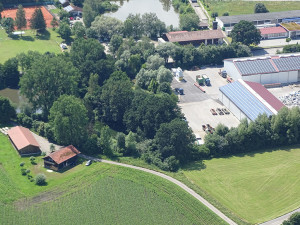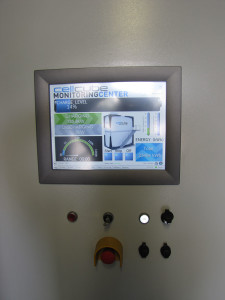
Beitrag im Handelsblatt zum Thema PV-Hybrid Systeme
30. June 2015
Barriers and solutions to implementing renewable energies on Caribbean islands in respect of technical, economic, political, and social conditions
1. July 2015Smart Power Flow

Relieve the distribution network
In this project, for the first time of a large scale stationary redox-flow battery (CellCube FB200-400 DC) of the company Gildemeister energy solutions has been integrated into a distribution grid in order to reinforce an electrical network with a high share of renewable energies. The main goal was to quantify which network expansion measures can be avoided through the usage of battery storage systems and to what extent.
Analysis and optimization
The main objectives of the project were the technical and economic analysis and optimization of network expansions and usage of local energy storage systems. As part of the project, a redox-flow storage of the company Gildemeister energy solutions was integrated into the distribution network and adapted to a new demand profile, due to the rapid increase of renewable energies. The most important intermediate steps were: identification of network characteristics for achieving an effective optimization of network expansion versus the implementation of decentralized energy storage systems; development of battery inverters for 200 kW DC / 500kVA redox-flow batteries; demonstration and confirmation of the analytically identified network optimization measures.
A simulation was developed to determine the optimal placement of big stationary batteries within distribution grids with high shares of renewable energies. The aim of the model was to facilitate a wide-scale mentation of stationary batteries into the German electrical grid.
Realization in three steps
Phase 1: Optimization of the location of a redox flow battery in the grid of LVN (LEW Verteilnetz GmbH) by using simulation tools; development of a battery inverter (first year)
Phase 2: Integration of the battery into the grid of LVN and validation of the simulation models by using measured data (second year)
Phase 3: Development of a concept for the integration of large battery storage systems into distribution grids; technical and economical evaluation of grid extension versus integration of battery systems into the distribution grid (third year).
Project period: 01.08.2013 - 31.07.2016
In this project, for the first time of a large scale stationary redox-flow battery (CellCube FB200-400 DC) of the company Gildemeister energy solutions has been integrated into a distribution grid in order to reinforce an electrical network with a high share of renewable energies. The main goal was to quantify which network expansion measures can be avoided through the usage of battery storage systems and to what extent.
Analysis and optimization
The main objectives of the project were the technical and economic analysis and optimization of network expansions and usage of local energy storage systems. As part of the project, a redox-flow storage of the company Gildemeister energy solutions was integrated into the distribution network and adapted to a new demand profile, due to the rapid increase of renewable energies. The most important intermediate steps were: identification of network characteristics for achieving an effective optimization of network expansion versus the implementation of decentralized energy storage systems; development of battery inverters for 200 kW DC / 500kVA redox-flow batteries; demonstration and confirmation of the analytically identified network optimization measures.
A simulation was developed to determine the optimal placement of big stationary batteries within distribution grids with high shares of renewable energies. The aim of the model was to facilitate a wide-scale mentation of stationary batteries into the German electrical grid.
Realization in three steps
Phase 1: Optimization of the location of a redox flow battery in the grid of LVN (LEW Verteilnetz GmbH) by using simulation tools; development of a battery inverter (first year)
Phase 2: Integration of the battery into the grid of LVN and validation of the simulation models by using measured data (second year)
Phase 3: Development of a concept for the integration of large battery storage systems into distribution grids; technical and economical evaluation of grid extension versus integration of battery systems into the distribution grid (third year).
Project period: 01.08.2013 - 31.07.2016
Photos

Funded as one of 38 lighthouse projects within the program "Batteries in local gridsz“ by the German Federal Ministry for Economic Affairs and Energy. (Funding number 0325522A)
Research at RLI is supported by the Reiner Lemoine Foundation.
“Technical and Economic Comparison of Grid Supportive Vanadium Redox Flow Batteries for Primary Control Reserve and Community Electricity Storage”. M. Resch, J. Bühler, B. Schachler, R. Kunert, A. Meier, A. Sumper. 2018
Abschlussbericht: „Smart Power Flow - Optimierung der Netzerweiterung versus Energiespeicher auf der Verteilnetzebene infolge zunehmender regenerativer Leistungsflüsse“. J. Bühler, M. Resch, B. Schachler, G. Merei, B. Ortiz, P. Schwaegerl. 2017
M. Resch, J. Bühler, M. Klausen, A. Sumper, "Impact of operation strategies of large scale battery systems on distribution grid planning in Germany," in Renewable and Sustainable Energy Reviews, Volume 74, July 2017, Pages 1042–1063.
O. Camacho Rascon, M. Resch, B. Schachler, J. Bühler, A. Sumper, "Increasing the Hosting Capacity of Distribution Grids by Implementing Residential PV Storage Systems and Reactive Power Control" i. E. 13th European Energy Market Conference (EEM)
B. Schachler, R. Kunert, J. Bühler, M. Resch, “Technisch-wirtschaftliche Optimierung der Teilnahme einer netzdienlichen Großbatterie am Primärregelleistungsmarkt”, in 4. Konferenz „Zukünftige Stromnetze für Erneuerbare Energien“, Berlin, Deutschland, 2017
O. Rascon, M. Resch, J. Bühler, A. Sumper, “Techno-economic comparison of a schedule based and a forecast based control strategy for residential photovoltaic storage systems in Germany”, in Electrical Engineering, Volume 98, Issue 4, S. 375–383, 2016.
M. Klausen, M. Resch, J. Bühler, “Analysis of a potential single and combined business model for stationary battery storage systems”, in Energy Procedia, Volume 99, November 2016, Pages 321–331, 2016.
E. Gaudchau, M. Resch, A. Zeh, "Quartierspeicher – Definition, rechtlicher Rahmen und Perspektiven" in Ökologisches Wirtschaften 2.2016 (31), S. 26-27.
A. Gonzalez, J. Bühler, B. Kleinschmit, M. Resch, “Analysis of Potential Distribution and Size of Photovoltaic Systems on Rural Rooftops”, in GI Forum, Salzburg, Österreich, 2015.
J. Bühler, M. Resch, J. Wiemann, J. Twele, „Lebenszyklusanalyse von Großbatterien am deutschen Regelenergiemarkt“, in IEWT 2015, Wien, Österreich, 2015.
M. Resch, J. Bühler, H. Huyskens, A. Sumper, „Optimale Positionierung von Großbatterien in Verteilnetzen“, in 30. Symposium Photovoltaische Solarenergie, Bad Staffelstein, Deutschland, 2015.
M. Resch, B. Ramadhani, J. Bühler, A. Sumper, “Comparison of the control strategies of residential PV storage systems”, in IRES 2015, Düsseldorf, Deutschland, 2015.
Abschlussbericht: „Smart Power Flow - Optimierung der Netzerweiterung versus Energiespeicher auf der Verteilnetzebene infolge zunehmender regenerativer Leistungsflüsse“. J. Bühler, M. Resch, B. Schachler, G. Merei, B. Ortiz, P. Schwaegerl. 2017
M. Resch, J. Bühler, M. Klausen, A. Sumper, "Impact of operation strategies of large scale battery systems on distribution grid planning in Germany," in Renewable and Sustainable Energy Reviews, Volume 74, July 2017, Pages 1042–1063.
O. Camacho Rascon, M. Resch, B. Schachler, J. Bühler, A. Sumper, "Increasing the Hosting Capacity of Distribution Grids by Implementing Residential PV Storage Systems and Reactive Power Control" i. E. 13th European Energy Market Conference (EEM)
B. Schachler, R. Kunert, J. Bühler, M. Resch, “Technisch-wirtschaftliche Optimierung der Teilnahme einer netzdienlichen Großbatterie am Primärregelleistungsmarkt”, in 4. Konferenz „Zukünftige Stromnetze für Erneuerbare Energien“, Berlin, Deutschland, 2017
O. Rascon, M. Resch, J. Bühler, A. Sumper, “Techno-economic comparison of a schedule based and a forecast based control strategy for residential photovoltaic storage systems in Germany”, in Electrical Engineering, Volume 98, Issue 4, S. 375–383, 2016.
M. Klausen, M. Resch, J. Bühler, “Analysis of a potential single and combined business model for stationary battery storage systems”, in Energy Procedia, Volume 99, November 2016, Pages 321–331, 2016.
E. Gaudchau, M. Resch, A. Zeh, "Quartierspeicher – Definition, rechtlicher Rahmen und Perspektiven" in Ökologisches Wirtschaften 2.2016 (31), S. 26-27.
A. Gonzalez, J. Bühler, B. Kleinschmit, M. Resch, “Analysis of Potential Distribution and Size of Photovoltaic Systems on Rural Rooftops”, in GI Forum, Salzburg, Österreich, 2015.
J. Bühler, M. Resch, J. Wiemann, J. Twele, „Lebenszyklusanalyse von Großbatterien am deutschen Regelenergiemarkt“, in IEWT 2015, Wien, Österreich, 2015.
M. Resch, J. Bühler, H. Huyskens, A. Sumper, „Optimale Positionierung von Großbatterien in Verteilnetzen“, in 30. Symposium Photovoltaische Solarenergie, Bad Staffelstein, Deutschland, 2015.
M. Resch, B. Ramadhani, J. Bühler, A. Sumper, “Comparison of the control strategies of residential PV storage systems”, in IRES 2015, Düsseldorf, Deutschland, 2015.













